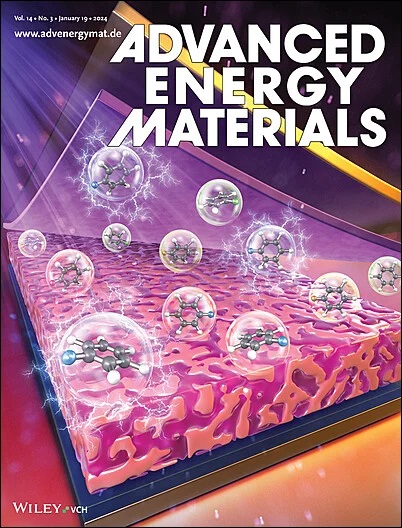碱水电解动态操作下探针电极变换
IF 24.4
1区 材料科学
Q1 CHEMISTRY, PHYSICAL
引用次数: 0
摘要
碱性水电解槽(awe)在大规模制氢领域起着举足轻重的作用。然而,awe在电极退化方面面临着重大挑战,特别是在动态操作条件下,频繁启动/关闭期间的反向电流现象会引起电极退化。因此,本研究旨在理顺这些条件下awe的降解机制。本文首次采用三电极膜电极组件(MEA)来解耦阳极和阴极的极化行为。根据提出的加速压力测试方案,该装置允许在频繁的反向电流操作期间跟踪单个电极的性能变化。将operando细胞研究与原位和死后表征相结合,表明持续形成高活性物质镍(氧)氢氧化物,提高了阳极析氧反应的性能。相反,镍不可逆氧化生成β-氢氧化镍导致阴极严重降解,导致材料溶解,电导率差,析氢反应的催化活性丧失。这些结果为碱性水电解镍基电极的转化机制提供了新的见解,并表明具有更高氧化还原可逆性的阴极可以潜在地提高电池在动态条件下的耐久性。本文章由计算机程序翻译,如有差异,请以英文原文为准。

Probing Electrode Transformation under Dynamic Operation for Alkaline Water Electrolysis
Alkaline water electrolyzers (AWEs) play a pivotal role in the realm of large-scale hydrogen production. However, AWEs face significant challenges in electrode degradation particularly under dynamic operating conditions, induced by reverse current phenomenon during frequent startup/shutdown. Herein, this study aims to rationalize the degradation mechanisms of AWEs under these conditions. A three-electrode membrane electrode assembly (MEA) setup is first utilized to decouple polarization behaviors of anode and cathode in AWEs. Following a proposed accelerated stress testing protocol, the setup allows for tracking individual electrode performance transformations during frequent reverse current operation. Integrating operando cell studies with in situ and post-mortem characterizations, it is showed that continuous formation of highly active species, nickel (oxy)hydroxides, improves the anode performance for oxygen evolution reaction. On the contrary, irreversible oxidation of nickel to β-nickel hydroxide results in a severe degradation of cathode, leading to material dissolution, poor electrical conductivity and loss of catalytic activity for hydrogen evolution reaction. These results provide insights in nickel-based electrode transformation mechanisms for alkaline water electrolysis and indicate that cathode with higher redox reversibility can potentially improve durability of AWEs under dynamic conditions.
求助全文
通过发布文献求助,成功后即可免费获取论文全文。
去求助
来源期刊

Advanced Energy Materials
CHEMISTRY, PHYSICAL-ENERGY & FUELS
CiteScore
41.90
自引率
4.00%
发文量
889
审稿时长
1.4 months
期刊介绍:
Established in 2011, Advanced Energy Materials is an international, interdisciplinary, English-language journal that focuses on materials used in energy harvesting, conversion, and storage. It is regarded as a top-quality journal alongside Advanced Materials, Advanced Functional Materials, and Small.
With a 2022 Impact Factor of 27.8, Advanced Energy Materials is considered a prime source for the best energy-related research. The journal covers a wide range of topics in energy-related research, including organic and inorganic photovoltaics, batteries and supercapacitors, fuel cells, hydrogen generation and storage, thermoelectrics, water splitting and photocatalysis, solar fuels and thermosolar power, magnetocalorics, and piezoelectronics.
The readership of Advanced Energy Materials includes materials scientists, chemists, physicists, and engineers in both academia and industry. The journal is indexed in various databases and collections, such as Advanced Technologies & Aerospace Database, FIZ Karlsruhe, INSPEC (IET), Science Citation Index Expanded, Technology Collection, and Web of Science, among others.
 求助内容:
求助内容: 应助结果提醒方式:
应助结果提醒方式:


